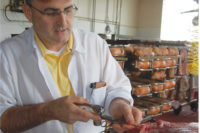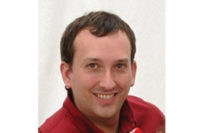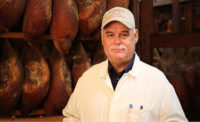The restaurant scene in Atlanta and its surrounding suburbs is filled with creative concepts and talented chefs. For 30 years, Kirk Halpern has worked to provide them with quality meats and seafood. After a hiatus, he has returned to the purveying business, with a new focus on meeting the needs of independent chefs.
The new venture, Farmers and Fishermen Purveyors, has a business model that is part old-fashioned, part cutting edge. The old-fashioned part is providing unsurpassed satisfaction and customer service. To do that, Farmers & Fishermen will provide 7-day-a-week service, allowing their restaurant partners to place orders up to midnight to get next-day delivery.
“We are one of the very few meat purveyors in the industry, and especially in this market, that not only allows Saturday and Sunday delivery, but we encourage it,” says Kirk Halpern, the company’s founder. “You can call us up until midnight on Friday night and get the order on Saturday morning. You can call us Saturday morning and get the order Saturday afternoon.”
The Halpern family goes back three generations in the Atlanta meat and seafood industry. Buckhead Beef was founded by Kirk’s father, Howard Halpern, in 1983. Kirk Halpern joined that company in 1989 and later founded Halperns’ Steak & Seafood. Halperns’ grew into a leading distributor of meat and seafood and was named The National Provisioner Processor of the Year in 2010. Halperns’ was acquired by Gordon Food Service in 2015, and Kirk Halpern left that business in October, 2017. With his post-employment restrictions having expired, he went back into the purveying business in the Atlanta area with his son, Ben.
“I think we can extend value to the marketplace, and it’s a great industry for me to train and develop my son,” he says, pointing out that many of the family-owned purveyors have been acquired by the larger broadline distributors. As the family-run businesses are incorporated into larger operators, that next generation of talent is finding other career options.
Ben, a graduate from Tulane University with a double major in business management and marketing, is excited for the opportunity to enter into the family business. He has hit the streets selling.
“I’ve been exposed to it since a young age and saw my dad’s passion and his work ethic in building his previous companies,” he says. “I’m honored to work for my dad, who’s very committed to this industry.”
Building a team
Kirk Halpern acquired a facility in Norcross and began the process of turning it into a processing and distribution plant. It is a little over 20,000 square feet in size and contains several coolers dedicated to meat products, fresh seafood and frozen seafood. Each room, once the shelving is installed, will hold fewer than 100 pallets apiece, but that fits the business model of Farmers & Fishermen. The dock is small, because Farmer’s won’t be loading large 18-wheeler trucks to make deliveries. Instead, products will be loaded onto refrigerated Mercedes Sprinter vans, which are perfect for small loads, making multiple stops and navigating through Atlanta’s perpetually busy traffic.
“I’m going small. The model is not for a $500 million company; the model is for a $50 million company,” he explains. “What I foresee is, you get an order. One employee goes into a freezer, drops a pallet in the middle of the room, grabs two boxes of this, four of this, one of this, and it goes onto the dock.”
“Simply put, this building is built for speed,” adds David Rose, chief operating officer/partner. “The layout of this building is designed to pull orders quickly, and in turn get them loaded quickly onto the vans, to get them in and out of Atlanta’s traffic quickly.”
Though Farmers & Fishermen has been in business just a few weeks, it already has sold more than $100,000 a week. Rose is excited by the opportunities that the company presents to the Atlanta restaurant industry.
“We’re going to stand out because we have the ability to make decisions quickly, offer new items quickly, respond to the customers’ wishes, desires and suggestions quickly. Basically, we’re going to have the ability to try anything,” he says.
The team that Halpern has assembled is another asset for the new company. Many of them, like Rose, are former colleagues from Halpern’s other businesses. Others had great reputations in their chosen fields and were needed to help with key aspects of the business. Pacifico “Podge” Sgambato, for example, oversees the seafood portion of Farmers & Fishermen. His knowledge of seafood is the equal to Halpern’s knowledge of red meat.
“I left the corporate world, and I prefer to be a little smaller, so you can pay attention to the customer and be at their disposal,” Sgambato says of his decision to join the company. He will be sourcing local fish whenever possible and underutilized species, which is good from a sustainability perspective and gives chefs something that their competition may not have.
“We give the customers all the ammunition, with great seafood and great proteins, so who wouldn’t want to try it? We’re not a food factory. Everybody here cares about what they’re selling,” he says.
Every employee has the term “partner” included as part of their title. Halpern feels that if he calls all the employees partners and treats them as partners, they will treat the business and their customers as partners.
The facility has rooms for oysters and mussels, a meat cut shop, burger production and dry goods, including for high-end spices and olive oils. Not everything was ready from Day One, and that was by design. Halpern says that the team will work to get the rest of the operations ironed out before working on patty production. Even then, it will not be a large-scale ground beef operation.
“Again, it’s go small or go home. It’s going to be for the chef who wants a small production run, with [a custom blend of] sirloin, brisket and short rib,” Halpern explains.
Ultimately, he sees Farmers & Fishermen operating with an Amazon-type model, where chefs can pick not only their meats and seafood products, but also their high-end seasonings, pesto and truffles, and have it delivered with next-day or even same-day service.
Another aspect of the company that will roll out later is a program to give back to the Atlanta community. The Farmers & Fishermen Charitable Beef Program features Angus beef from Northeastern Iowa. For every pound sold, Farmers & Fishermen will donate a portion to charity. The company will offer donations to a group of charities, and the restaurateur can choose a particular favorite.
“I’m going to take a grouping of several charitable programs – Meals on Wheels, Helping Hands – programs that are either culinary related, agricultural related, employment related,” Halpern says.
Each of the charities will benefit the Atlanta community, so the restaurateur or chef can choose the charity that appeals most to him or her. The result is a win for everyone. Atlanta charities get needed assistance. Chefs can note on their menus that their steaks are helping area charities, and their diners can feel good about the steaks and the restaurant. Farmers & Fishermen can fulfill one of the core parts of its mission, which was charitable work.
During his 18-month layoff from the purveying industry, Halpern made some real estate investments and bought, renovated and branded a restaurant, The American Steak and Oyster Bar, in Murrells Inlet, S.C. Most importantly, he had the time to think about what he would want in a new venture, to the smallest detail — such as the idea of smaller delivery vans over trucks.
“There is a shortage of CDL (commercial driver’s license) drivers. The driver population is aging out, you don’t have enough young individuals as drivers,” Halpern says. His hope is to attract people who might be working part-time as Lyft or Uber drivers. Instead of using their own vehicles, they can drive for Farmers & Fishermen in company-provided luxury vans for guaranteed pay.
Elsewhere in the facility, Farmers & Fisherman has little touches to improve the quality of the products. Its boxes are non-corrugated and are 100-percent recyclable. The ice machines produce ice that will not damage the seafood. Tuna, instead of being shipped whole, are fabricated and packed in Sri Lanka and arrive in the Atlanta airport 48 hours after coming off the fishing boat, reducing both the labor and the costs to the customer while giving the customer the freshest tuna possible. Even the invoices have a polite “Check please” note included instead of a glaring and impersonal COD sticker.
Those changes will serve to further fine-tune a process that the company’s executive and sales team knows very well. The focus toward small restaurants and small businesses is a strong suit as well. While Halpern has grown businesses to hundreds of millions of dollars in annual sales with large-scale customers, he has also worked with local farmers to grow farm-to-table programs.
“I know this business; it’s where I’m strongest,” he says. “I know where the industry is heading. I’ve always been cutting edge on small, niche family farmers, and I think that’s where the customers want us to be. We look forward to working hard for our customers for years to come.”







